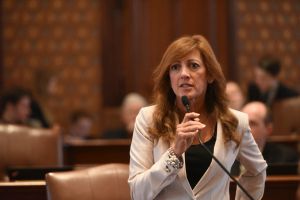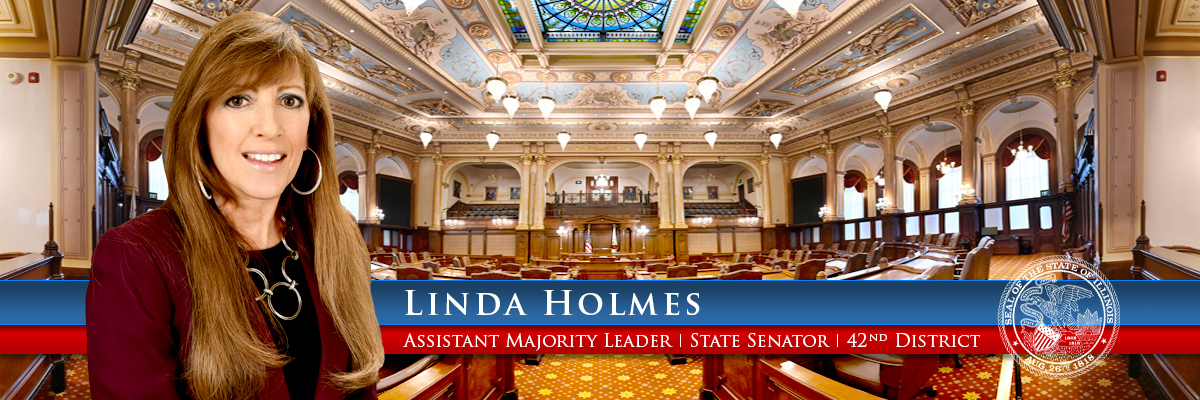- Details
- Category: New Releases
 SPRINGFIELD- On Tuesday, the Illinois State Board of Education announced that 28 Illinois school districts are eligible to receive a Property Tax Relief Grant for fiscal year 2019. The grant covers a portion of local property tax reductions up to the statutory limit.
SPRINGFIELD- On Tuesday, the Illinois State Board of Education announced that 28 Illinois school districts are eligible to receive a Property Tax Relief Grant for fiscal year 2019. The grant covers a portion of local property tax reductions up to the statutory limit.
Oswego District 308 was among 373 districts who applied for the relief but did not make the short eligibility list. Lawmakers Sen. Linda Holmes (D-Aurora) and Rep. Stephanie Kifowit (D-Oswego) learned of the outcome and reacted with concerns for students and local property taxpayers.
“I’m disappointed our districts won’t have this resource to support local schools and taxpayers,” Sen. Holmes said. “Seeing the number and amount of this year’s relief grants, I believe the formula needs some modifications to make the system more fair and equitable going forward.”
- Details
- Category: New Releases
 SPRINGFIELD – Young people in Illinois now have increased access to information about human papillomavirus (HPV) under a measure sponsored by State Senator Linda Holmes (D – Aurora) that became law today.
SPRINGFIELD – Young people in Illinois now have increased access to information about human papillomavirus (HPV) under a measure sponsored by State Senator Linda Holmes (D – Aurora) that became law today.
Under previous law, schools were only required to provide HPV information to female students entering the 6th grade. The new law requires schools to ensure that all students, both male and female, receive the necessary information.
- Details
- Category: New Releases
 SPRINGFIELD – State Senator Linda Holmes (D-Aurora) passed legislation through the Illinois Senate to ensure that victims’ voices are heard during plea agreements, in juvenile cases or when the defendant is found not guilty due to insanity.
SPRINGFIELD – State Senator Linda Holmes (D-Aurora) passed legislation through the Illinois Senate to ensure that victims’ voices are heard during plea agreements, in juvenile cases or when the defendant is found not guilty due to insanity.
The proposal came from the Illinois Attorney General’s office, who believes courts do not consistently allow crime victims to testify.
“The victims affected by these criminals deserve to have their voices heard during the sentencing process,” Holmes said. “As the affected party, we need to ensure their opinions are not silenced.”
Currently, victims and prosecutors are not given notice of status hearings where information is provided to the court. As a result, they may not be prepared to proceed in a way that adequately protects the victims’ rights.
Holmes’ proposal, House Bill 5573, passed the Illinois Senate with a vote of 49-0. It has now passed both chambers of the General Assembly and will head to the governor’s desk for consideration.
- Details
- Category: New Releases
 SPRINGFIELD – State Senator Linda Holmes (D-Aurora) advanced legislation to ban sales on ivory through the Illinois Senate earlier today.
SPRINGFIELD – State Senator Linda Holmes (D-Aurora) advanced legislation to ban sales on ivory through the Illinois Senate earlier today.
“This is a meaningful step that will help stop the brutal, illegal poaching of elephants abroad,” Holmes said. “It’s our responsibility to protect these magnificent animals before it’s too late.”
According to the World Wildlife Foundation, tens of thousands of elephants are killed every year for their ivory tusks. In the 1980s, it is estimated nearly 100,000 elephants were killed each year and up to 80 percent of herds were lost in some areas.
Holmes’ proposal, House Bill 4843, charges individuals caught selling ivory with a Class A misdemeanor and fine of up to $1000.
“Decades of reckless poaching nearly wiped out these animals,” Holmes said. “Over time, these types of responsible, common sense measures will help bring them back from the brink of extinction.”
Guns and knives that are older than 100 years and less than 20 percent ivory are exempt from the ban. Musical instruments older than 1975 and made from less than 20 percent ivory are also exempt from the ban. If signed into law, Illinois will join California, Hawaii, Nevada, New Jersey, New York, Oregon and Washington in banning the sale of ivory.
Holmes’ proposal passed the Illinois Senate with a vote of 49-0. It has now passed both chambers of the General Assembly.
More Articles …
Page 56 of 67




